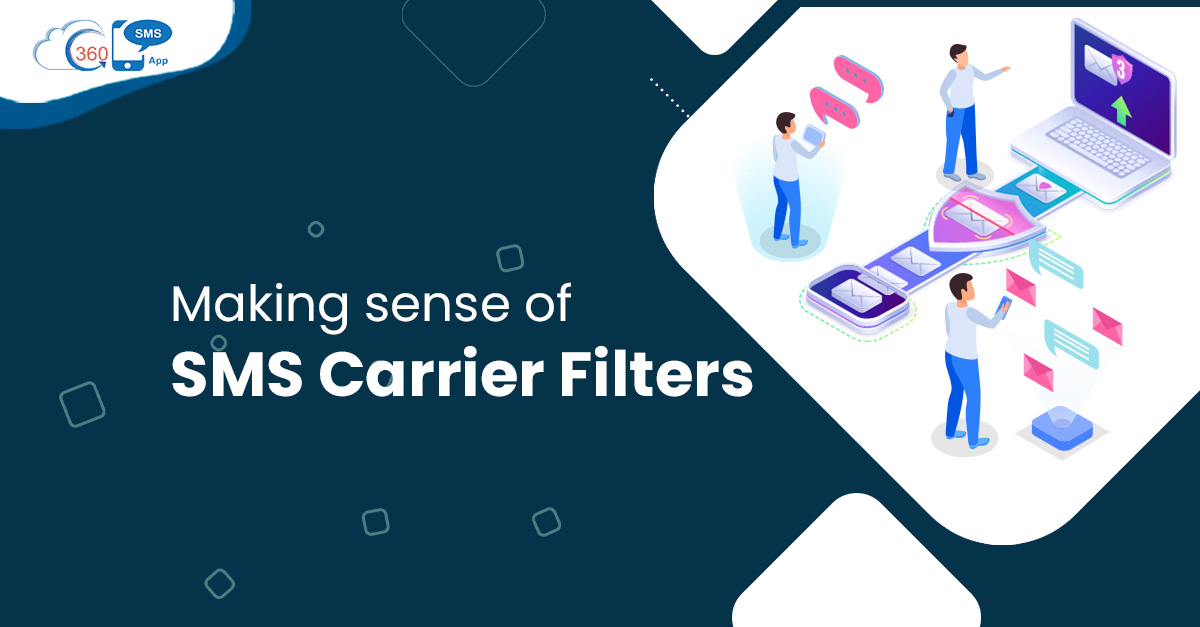Text messaging has become a reliable means of communication for businesses to interact faster at scale without investing much time. Also, users can easily maximize their returns with more targeted and personalized texting. Thus, organizations invest pretty good time, resources, and money to draft meaningful messages and SMS campaigns. But carrier filters can ruin all your effort.
But all the invested efforts become futile when text messages don’t get delivered to the recipient’s mobile phone. And the reason could be carrier filters. This is the reason why companies look forward to avoiding SMS carrier filters.
What are Carrier Filters?
Like emails, you cannot send text messages easily across the internet. If you use text messages for business communications, you must follow some SMS carrier rules and regulations to ensure that the recipient’s carrier delivers text messages.
Mobile carriers filter and remove those messages which they consider inappropriate for a recipient. For instance: Inappropriate use of URLs while texting can end up in spam. But if used wisely, you can send URLs in texts without being marked as spam.
The other name for carrier filter is the SMS spam filter, but it doesn’t mean it catches only spam.
Why Carriers use filters?
To Reduce Attrition Rate
When subscribers receive back-to-back spam text messages, they often feel the need to switch to another mobile carrier. This increases the attrition rate of mobile carriers. Thus, to prevent users from switching to another network carrier, mobile carriers prefer blocking spam text messages by setting up filters to block certain messages. Therefore, it is extremely vital to avoid spam messages so that what you’re sending is not marked spam.
To Safeguard Mobile Users
When customers opt-in to receive texts, they do it for a better experience. Also, they expect their carriers to safeguard their interest and privacy. Thus, to deliver a good experience and prevent users from receiving unwanted messages, mobile carriers use a filtering system. Also, they try to identify spam, abusive, and fraud SMS to filter troublesome text messages before they reach customers. This would help to protect customers and loss of revenue as well.
To comply with Federal or Local Regulations
Countries follow texting regulations to send non-spammy text messages to their prospects and customers. And carrier filters are one such element that helps to block SMSes that violate these regulations. This way, it becomes easy for the carrier to comply with rules and regulations set by the government and steer clear of potential legal action.
What kind of filters do mobile carriers use?
There are no standard practices that mobile network carriers follow. So it could be based on various parameters. These filters can be certain keywords that a mobile carrier considers unfit or a cause of customer annoyance. Also, it could be unwanted messages which are sent even after a customer has opted out or filed a complaint against a particular number.
How to find out a text is filtered out or not?
The only way to find this out is by sending messages to yourself or the group of your known ones and perform a test. Sometimes carriers also pass on this information to SMS providers you choose, and further, they can inform you that a message has been filtered.
Stay away from Carrier Filters and Ensure sure-shot Texts Deliveries
Carrier filters always keep a check on what you’re sending to your customers through texts. Thus, if you’re well aware of the term Carrier Filters, you can prevent yourself from paying heavy penalties that may come across due to violation of texting rules. In addition to this, apart from reducing the attrition rate, you can also keep your customers happy by respecting their decisions of not receiving unwanted texts. More importantly, you can ensure sure-shot deliveries of text messages and prevent them from landing in spam folders.
360 SMS is a texting solution that can help you keep spam messages at bay. To know more on how to do it, contact us here.
Recent Blogs

Zoho Text Solutions to Boost Client Engagement & Communication
Listen to this article Every Zoho communication becomes more effective when it reaches your target customers reliably. And the reason…

Salesforce WhatsApp Marketing Strategy for Modern & Agile Businesses
Listen to this article Ever felt like your communication and messages are not getting the attention that they deserve? Get…

Top Salesforce Messaging Solutions Available on AppExchange
Listen to this article It can take several hours and days to find the right texting app on the AppExchange.…











